Boeing accepts plea deal
 Boeing is reportedly planning to plead guilty to criminal fraud conspiracy charges over two fatal 737 MAX crashes in 2018 and 2019, which killed 346 people.
Boeing is reportedly planning to plead guilty to criminal fraud conspiracy charges over two fatal 737 MAX crashes in 2018 and 2019, which killed 346 people.
On October 29, 2018, Lion Air Flight 610 crashed into the Java Sea shortly after takeoff from Jakarta, Indonesia, killing all 189 passengers and crew on board. On March 10, 2019, Ethiopian Airlines Flight 302 crashed near Bishoftu, Ethiopia, six minutes after taking off from Addis Ababa, resulting in the deaths of all 157 people on board.
Both crashes were linked to the malfunction of the aircraft's Maneuvering Characteristics Augmentation System (MCAS), which caused the planes to enter an uncontrollable nosedive.
A plea deal, announced by the US Justice Department over the weekend, allegedly includes a $243.6 million criminal fine and a commitment from Boeing to invest $455 million over three years to enhance safety and compliance programs.
The deal may also see the appointment of an independent monitor to oversee Boeing’s compliance for three years, a move the Justice Department opposes extending despite calls from the families of crash victims for a five-year oversight period.
The families continue to challenge the agreement, demanding a public trial and greater accountability from Boeing.
Attorney Paul Cassell, representing the families, has described the deal as “crafty lawyering between Boeing and DOJ”.
This development arrives at a time of rising geopolitical tensions, which are increasing defence spending globally.
Boeing's continued participation in the defence market remains crucial, despite the legal and operational challenges tied to the 737 MAX incidents.
US District Judge Reed O'Connor, who previously condemned Boeing’s actions as “egregious criminal conduct”, will decide whether to accept the plea deal.
In the meantime, Boeing's financial indicators, such as bond trading and stock performance, have shown resilience, reflecting investor confidence in the company's long-term stability.
Reports say the major aeroplane-maker is currently in discussions with the U.S. Defense Department regarding the potential impact of its planned guilty plea on its government contracts.
Boeing has lucrative contracts with the US Defense Department and NASA. Although these agencies can waive restrictions, the potential fallout is considerable, as Boeing’s Defense and Space unit is crucial to its operations, generating $7 billion in first-quarter sales this year.
Pentagon spokesperson Air Force Major General Patrick Ryder has told reporters that the department would evaluate Boeing’s remediation plans and agreement with the Justice Department.
“DOD will assess the company's remediation plans and agreement with the Department of Justice to make a determination as to what steps are necessary and appropriate to protect the federal government,” Ryder said, but did not confirm whether discussions with Boeing were taking place.
Boeing's government contracts accounted for 37 per cent of its revenue last year, including $14.8 billion in Pentagon contracts in 2022.
Despite the potential financial risks, S&P Global Ratings analysts believe the costs associated with the plea deal are manageable for Boeing, allowing to company to continue to be a key supplier of defence and space products.
Internationally, the deal will also be under scrutiny, as Boeing is a significant player in global defence markets.
Countries such as Canada and the European Union have regulations barring companies with criminal convictions from bidding on public contracts.
However, industry experts suggest that geopolitical considerations and the lack of alternative suppliers for certain products, like Boeing’s P-8A maritime patrol plane, may mitigate these restrictions.








 Print
Print